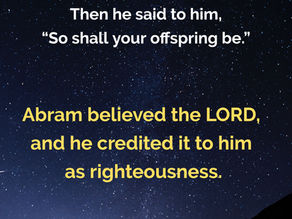Matthew 1:18-21 - His People
- Chad Werkhoven
- Jun 2, 2025
- 4 min read
Jesus came to save His people from their sins.
Matthew 1:18-21 (NIV)
18 This is how the birth of Jesus the Messiah came about: His mother Mary was pledged to be married to Joseph, but before they came together, she was found to be pregnant through the Holy Spirit. 19 Because Joseph her husband was faithful to the law, and yet did not want to expose her to public disgrace, he had in mind to divorce her quietly.
20 But after he had considered this, an angel of the Lord appeared to him in a dream and said, “Joseph son of David, do not be afraid to take Mary home as your wife, because what is conceived in her is from the Holy Spirit. 21 She will give birth to a son, and you are to give him the name Jesus, because he will save his people from their sins.”
Canons of Dordt
Point 2 - Limited Atonement
Article 8: The Saving Effectiveness of Christ’s Death
For it was the entirely free plan and very gracious will and intention of God the Father
that the enlivening and saving effectiveness of his Son’s costly death
should work itself out in all the elect,
in order that God might grant justifying faith to them only
and thereby lead them without fail to salvation.
In other words, it was God’s will that Christ
through the blood of the cross
(by which he confirmed the new covenant)
should effectively redeem
from every people, tribe, nation, and language
all those and only those
who were chosen from eternity to salvation
and given to him by the Father;
that Christ should grant them faith (which, like the Holy Spirit’s other saving gifts, he acquired for them by his death).
It was also God’s will
that Christ should cleanse them by his blood from all their sins,
both original and actual,
whether committed before or after their coming to faith;
that he should faithfully preserve them to the very end;
and that he should finally present them to himself, a glorious people, without spot or wrinkle.
Summary
This isn't a Bible passage we read often in June, but one of the benefits of reading parts of the Christmas stories at other times of the year is that it can make some of the otherwise unnoticed elements a bit clearer. One of the most important aspects of Joseph's angelic dream is very evident no matter when this passage gets read: His Son would be no ordinary baby.
The angel explained to him that what is conceived in Mary is from the Holy Spirit. We have the benefit of reading those words some two thousand years after that fateful night, and though the announcement doesn't hit us with the same level of shock it hit Joseph, we still can't wrap our heads around it - so imagine what it must have been like for Joseph to process it!
All of us have a particular weakness the enemy targets from time to time, hoping to stir up doubt about the truth of Scripture. Maybe for you it’s the sense that the universe appears much older than Genesis suggests. Others wrestle with the account of the flood or God’s seemingly genocidal command to wipe out the Canaanites. Deep down, you know these objections don’t hold up — but they still succeed in clouding the mind now and then.
But one of the steepest hills for people to climb is the idea that Jesus was born of a virgin, as the angel here describes, having been conceived by the Holy Spirit. Yet it's this very strange nature - fully God, yet fully a man born of a woman - that would be required to both pay the penalty for your sin and present on your behalf the perfect righteousness the covenant requires for you to be at peace with God.
Dig Deeper
It's the otherwise ordinary name the angel commands Joseph to give to his son that grabs our attention today. The name Yehô·šûaʿ (Joshua - transliterated into Greek as Iēsous and English as Jesus) was every bit as common two millennia ago as the names Mike or Bob are today. So it must of really struck Joseph as odd that this one of a kind baby boy was to be given such an ordinary name!
But it's the straightforward meaning of this name that has become the most familiar in all of history that made it the most appropriate name possible: He saves. Although this baby would grow up to say and do all sorts of wonderful things, His primary mission would be to accomplish salvation from sin.
But there's one little pronoun in the angel's proclamation that brings us back to this morsel of the Christmas story in the first week of June. The angel of the Lord makes it clear from the very beginning that this boy who would save did not come to save everyone. He would save His people from their sins.
We've been studying this doctrine of Limited Atonement for over a month now, and so far we've seen no aspect of limitation at all; quite the opposite, in fact! We've been reminded that Jesus' death is of infinite value and that it was more than sufficient to atone for the sins of the whole world. Yet we refer to atonement as limited because it does not apply to all people. As we will see this week, the saving effectiveness of his Son’s costly death is limited to His people.
ACKNOWLEDGE WHO GOD IS: Our Father, who by the power of the Holy Spirit, caused the divine to take the form a child in Mary's womb;
ALIGN YOUR LIFE WITH GOD'S WILL: Pray that you would have the faith Joseph demonstrated in accepting the angel's difficult to understand message;
ASK GOD FOR WHAT YOU NEED:
Read the New Testament in a year! Today: Romans 13




















Comments